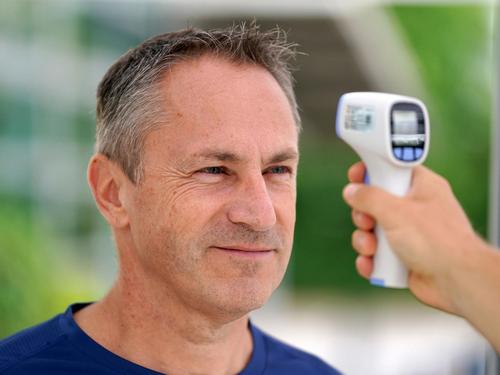Studies have shown that variants of the coronavirus carrying the E484K mutation, which affects the shape of the virus’ spike protein, could escape the immune response triggered by the current generation of vaccines – though they are still expected to offer good protection against illness and severe disease.
A modified version of the Oxford vaccine – one capable of neutralising the emerging coronavirus variants – could be ready by autumn, a senior executive at AstraZeneca has said.
“We’re working very hard and we’re already talking about not just the variants that we have to make in laboratories, but also the clinical studies that we need to run,” said research chief Sir Mene Pangalos in a media briefing hosted by the drugmaker.
“We’re very much aiming to try and have something ready by the autumn, so this year.”
The Independent reported last month that the Oxford team is adopting an “at-risk” approach to the variants and intends to begin synthesising new versions of the vaccine without waiting to find out if they will be needed, with professor Sarah Gilbert – one of the lead scientists – “actively working on this”.
Downing Street has also indicated that the Medicines and Healthcare products Regulatory Agency (MHRA) will be able to approve modified vaccines as quickly as required in the face of the new and emerging coronavirus variants.
Professor Andrew Pollard, director of the Oxford vaccine group, said work on designing a new vaccine could be completed rapidly.
“I think the actual work on designing a new vaccine is very, very quick because it’s essentially just switching out the genetic sequence for the spike protein, for the updated variants,” he said during Wednesday’s briefing.
“And then there’s manufacturing to do and then a small scale study.
“So all of that can be completed in a very short period of time, and the autumn is really the timing for having new vaccines available for use rather than for having the clinical trials run.”
Sir Mene said: “Our ambition is to be ready for the next round of immunisations that may be necessary as we go into next winter. That’s what we’re aiming for.”
Prof Pollard said it was likely that clinical trials would be needed to test the variant-specific vaccines, but would involve “hundreds” of people at the most.
“That’s a discussion which is ongoing with regulators about exactly what the data package is that they would need,” he said.
“The reason why it’s such a small number is because with an updated vaccine, the question is whether immune responses still look the same but against the new variants as they emerge.
“We don’t need to run studies on a large scale to prove efficacy. And so that’s why they’re much quicker and much smaller to conduct.”
Scientists at Oxford are understood to be confident that their vaccine will not need to be adapted in response to the British variant, known as B.1.1.7.
However, the team is assessing the ability of their candidate to provide protection against the Brazilian and South African variants, both of which carry the E484K mutation, with the results of this analysis set to be released within the next two weeks.
The government has meanwhile announced that it is launching a new study in the UK which will explore the possibility of ‘mixing and matching’ different coronavirus vaccines.
The trial, dubbed Com-Cov, will initially look at combining doses of the Oxford/AstraZeneca and Pfizer/BioNTech vaccines, but researchers said more candidates will be added to the list.
Professor Jonathan Van-Tam, who is overseeing the study, said: “Given the inevitable challenges of immunising large numbers of the population against Covid-19 and potential global supply constraints, there are definite advantages to having data that could support a more flexible immunisation programme, if needed and if approved by the medicines regulator.”
Those aged 50 and over are being called on to take part in the research, with over 800 patients expected to take part.
They will be recruited over the course of February through the NHS Covid-19 Vaccine Research Registry, with initial results expected to become available during the summer.
The study will initially include test eight different combinations, which include dosing regimens that are either 12 weeks apart or 28 days apart.
Earlier on Wednesday, health secretary Matt Hancock hailed the latest data on the Oxford vaccine as “absolutely superb”.
According to a new study, the jab offers 76 per cent protection up to three months after the first dose and could reduce transmission.
Cutting transmission is the key to lifting the most severe restrictions of lockdown more quickly and means infection levels could come down faster than they would otherwise.
Mr Hancock told BBC Breakfast: “We know from earlier trials that the vaccines are safe and effective at protecting the individual.
“We now know that the Oxford vaccine also reduces transmission and that will help us all to get out of this pandemic, frankly, which is why it is such good news that we should welcome.”
He told Times Radio the numbers of people in hospital was coming down and deaths would drop. Mr Hancock added the Oxford data suggested “we can have a high degree of confidence that that will come down quickly”.



